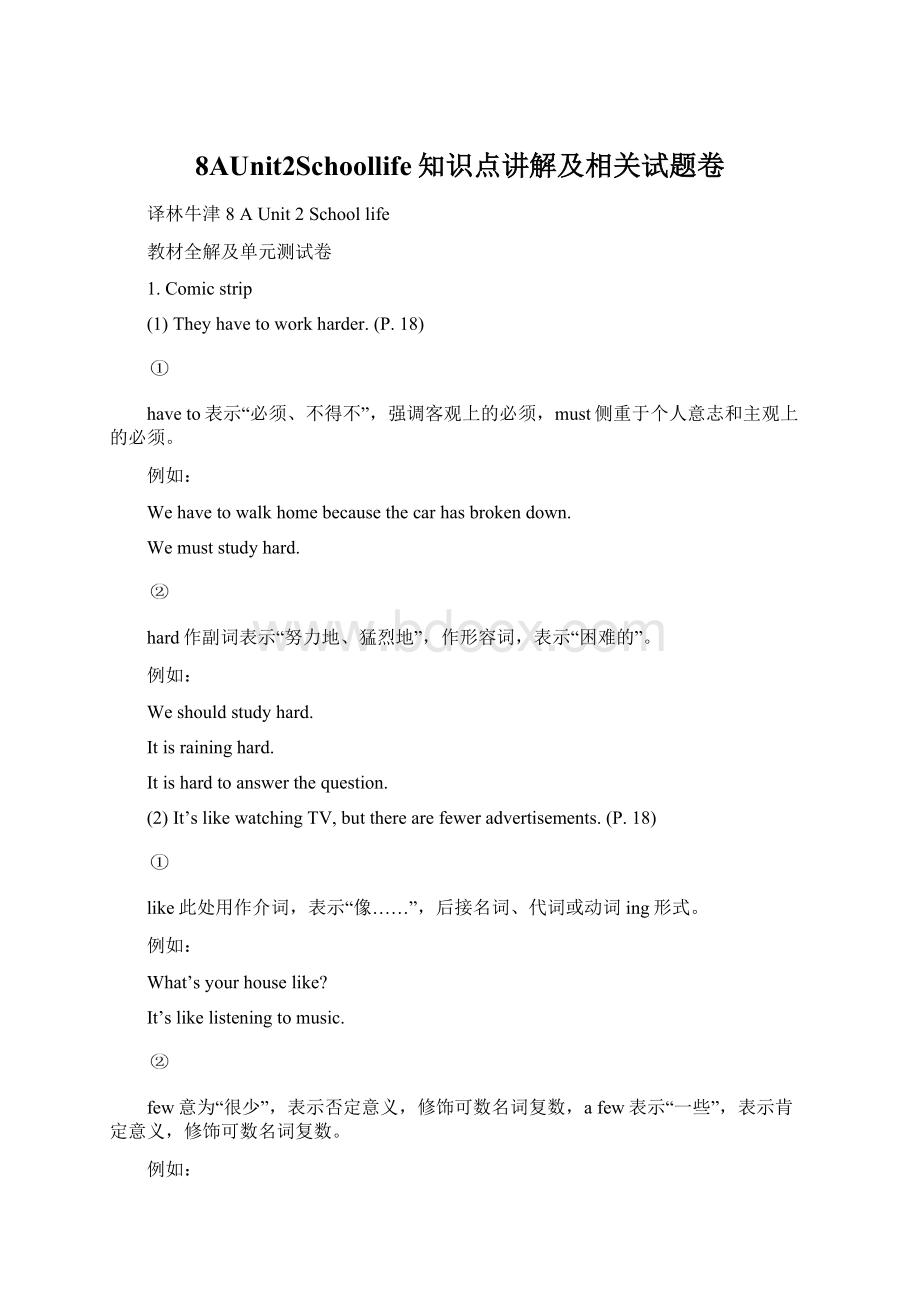8AUnit2Schoollife知识点讲解及相关试题卷.docx
《8AUnit2Schoollife知识点讲解及相关试题卷.docx》由会员分享,可在线阅读,更多相关《8AUnit2Schoollife知识点讲解及相关试题卷.docx(20页珍藏版)》请在冰豆网上搜索。

8AUnit2Schoollife知识点讲解及相关试题卷
译林牛津8AUnit2Schoollife
教材全解及单元测试卷
1.Comicstrip
(1)Theyhavetoworkharder.(P.18)
haveto表示“必须、不得不”,强调客观上的必须,must侧重于个人意志和主观上的必须。
例如:
Wehavetowalkhomebecausethecarhasbrokendown.
Wemuststudyhard.
hard作副词表示“努力地、猛烈地”,作形容词,表示“困难的”。
例如:
Weshouldstudyhard.
Itisraininghard.
Itishardtoanswerthequestion.
(2)It’slikewatchingTV,buttherearefeweradvertisements.(P.18)
like此处用作介词,表示“像……”,后接名词、代词或动词ing形式。
例如:
What’syourhouselike?
It’slikelisteningtomusic.
few意为“很少”,表示否定意义,修饰可数名词复数,afew表示“一些”,表示肯定意义,修饰可数名词复数。
例如:
Fewpeopleunderstandthisdifference.
IhaveafewfriendsinAmerica.
2.Welcometotheunit
(1)vacation(P.19)
vacation表示“假期”多用于美式英语中,而英式英语中用holiday。
beonvacation“在度假”,goonvacation“去度假”,takeavacation“度假”,thewinter/summervacation“寒/暑假”。
例如:
MrWangwasonvacationlastmonth.
TheyaregoingtoEnglandtospendtheirsummerholidays.
(2)I’dliketobuysomebiscuits.(P.19)
wouldlike意为“想要”,常用的结构有:
wouldlikesth.“想要某物”;wouldliketodosth.“想要做某事”。
例如:
Iwouldlikesomeapples.
Hewouldliketoeatsomebananas.
【拓展】
1.“Wouldyoulikesth.?
”句型的肯定回答用“Yes,please.”,否定回答用“No,thanks.”。
2.“Wouldyouliketodosth.?
”句型的肯定回答用“Yes,I’dlike/loveto.”,否定回答用“I’dlike/loveto,but...”。
(3)Shallwegotogether?
(P.19)
“Shallwe...?
”意为“我们……好吗?
”用于征求他人意见、向他人提出建议或者请求他人的许可,肯定回答用“Goodidea./That’sagoodidea./Ofcourse,I’dliketo.”,否定回答为“I’msorry,butI...”。
例如:
---Shallwegotothemuseum?
---That’sagoodidea.
(4)I’dliketo,buttheschoolfootballteamwillpractisethisSaturday.(P.19)
practise用作及物动词,意为“练习、操练”后接动名词作宾语。
Myyoungerbrotherpractisesplayingthepianoeveryday.
3.Reading
(1)Itisamixedschool.(P.20)
mixed这里作为形容词,意为“男女混合的”。
例如:
Alltheschoolsherearemixedones.
Ihadmixedfeelingsaboutmeetinghimagain.
【拓展】mix作动词,表示“混合、混在一起”,mixup意为“混合在一起”。
Let’smixtheflourwithwater.
Hemixedupalltheingredients.
(2)Amongallmysubjects,IlikeFrenchbest.(P.20)
like...best意为“最喜欢……”,可与含有favorite的句子互换。
Ilikesummerbest.
=Summerismyfavoriteseason.
(3)Learningforeignlanguagesisfun.(P.20)
动名词短语作主语时,谓语动词用单数形式。
例如:
Readinginthesunisbadforyoureyes.
Seeingisbelieving.
(4)Duringtheweek,wecanborrowmorebooksfromtheschoollibrary.(P.20)
borrow作及物动词,表示“借进来”,常用的结构为“borrowsth.fromsb.”“从某人拿借某物”,lend表示“借出去”,用于“lendsb.sth.=lendsth.tosb.”结构中。
例如:
Heborrowed1,000dollarsfromhisfriend.
Ilentmybiketohimyesterday.
=Ilenthimmybikeyesterday.
(5)Wecanalsobringinbooksandmagazinesfromhome.(P.20)
bringin表示“带来”。
LiuNanbroughtinsomebeautifulflowersfromhomeyesterday.
【拓展】bring相关短语
bringalong把……一起带来
bring...out出版、使呈现
bringup抚养长大
bring...tolife使……苏醒
(6)Neartheendoftheweek,wediscussthebookswithourclassmatesinclass.(P.20)
end作名词,表示“末端、尽头”,attheendof“在……尽头”,intheend“最后、终于”。
例如:
We’llhaveatestattheendofthismonth.
Heworkedouttheproblemintheend.
discuss作及物动词,表示“讨论”,discusssth.withsb.“和某人讨论某事”,名词为discussion。
例如:
Whydidn’tyoudiscussitwithyourteacher?
Hejoinedusinthediscussionyesterday.
(7)Timesseemstogofasterwhenwearereadinginterestingbooks.(P.20)
seem意为“仿佛、似乎”,常用于以下结构中
seem+形容词(seemtobe+形容词)意为“好像、似乎”。
Thatseemsveryeasy.
Thebookseems(tobe)quietinteresting.
seemtodosth.意为“好像做某事、似乎做某事”。
Thebabyseemstobeasleep.
Itseemstorain.
Itseemsthat...“好像……、似乎……”。
Itseemsthatnooneknowswhathappened.
Itseemsthatyouareright.
(8)Heoftenlistenscarefullytomyproblemsandoffersmehelp.(P.20)
offer/用作及物动词,意为“主动提出、自愿给予”,主要用法如下:
offersth.意为“提供某物、提供某事”。
Heofferedagoodplanforourholiday.
offertodosth.意为“(主动)提出做某事”。
Tomofferedtodriveustothebusstation.
offersb.sth./offersth.tosb.意为“(主动)给某人提供某物”。
Weshouldofferothersourhelp.
(9)OnFridayafternoon,ourschoolendsearlierthanusual.(P.20)
介词on用来表示具体某一天或某一天的上午、下午、晚上。
onMondayevening
ontheafternoonofMay1st
onacoldmorning
end用作动词,表示“结束”,相当于beover。
Whattimedoesyourschoolend?
usual意为“平常的、通常的”,asusual表示“像往常一样”。
It’susualforhimtogotoschoolonfoot.
Asusual,hegottoschoolat7o’clock.
(10)Ourteamwontwogameslastmonth.(P.20)
win此处用作及物动词,意为“赢得”,也可以作不及物动词,表示“获胜,赢”。
例如:
Whowonthemen’s400-metrerace?
Wemustwintoday.
【拓展】辨析win和beat/defeat
win所接的宾语一般表示比赛、战斗、辩论、奖金等名词;beat/defeat所接的宾语是参加比赛的人或者团队,意为“战胜、打败(某人)”。
LiLeibeatTomandwonthefirstprize.
(11)BothNancyandJohnareGrade8students.(P.22)
both...and...表示“……和……都、既……又……”,在句中连接两个并列关系的词。
例如:
Tomcanbothsinganddance.
BothJimandhiseldersisteraregoodatEnglish.
(12)IreadanarticlebyaboyfromtheUSA.(P.22)
by此处作介词,表示“由……、被……”。
例如:
ThisisabookbyYangHongying.
---Whowasthemusicby?
---ItwasbyMozart.
4.